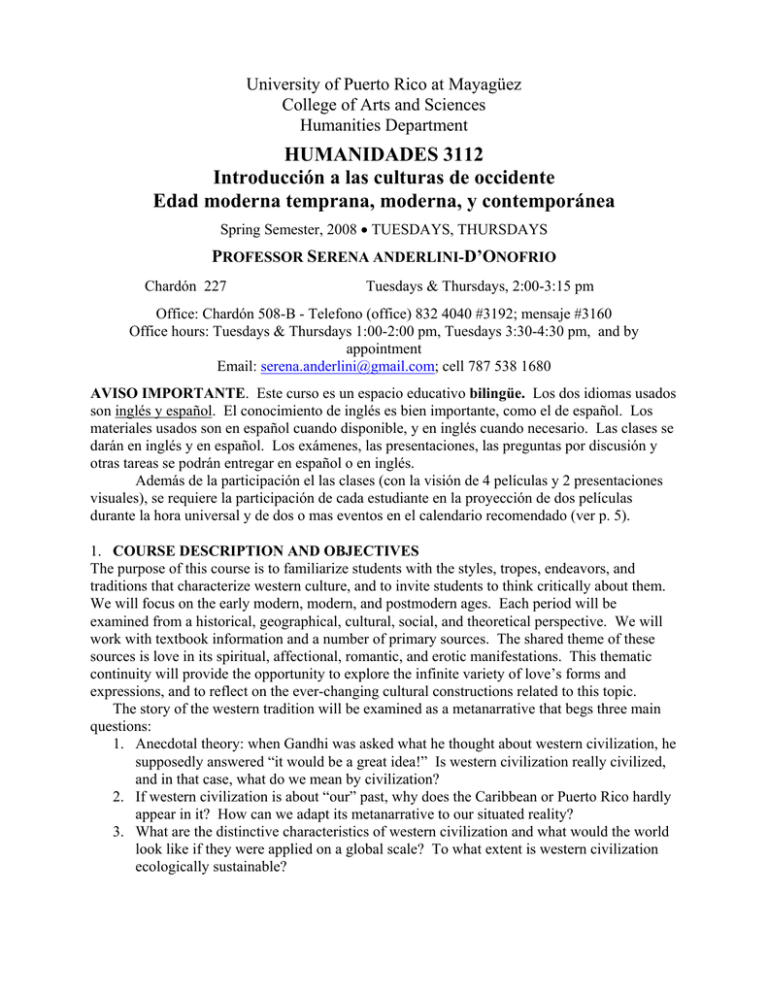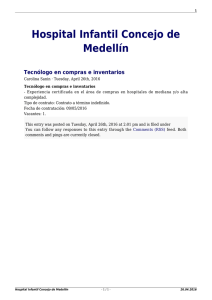Prontuario
Anuncio

University of Puerto Rico at Mayagüez College of Arts and Sciences Humanities Department HUMANIDADES 3112 Introducción a las culturas de occidente Edad moderna temprana, moderna, y contemporánea Spring Semester, 2008 • TUESDAYS, THURSDAYS PROFESSOR SERENA ANDERLINI-D’ONOFRIO Chardón 227 Tuesdays & Thursdays, 2:00-3:15 pm Office: Chardón 508-B - Telefono (office) 832 4040 #3192; mensaje #3160 Office hours: Tuesdays & Thursdays 1:00-2:00 pm, Tuesdays 3:30-4:30 pm, and by appointment Email: [email protected]; cell 787 538 1680 AVISO IMPORTANTE. Este curso es un espacio educativo bilingüe. Los dos idiomas usados son inglés y español. El conocimiento de inglés es bien importante, como el de español. Los materiales usados son en español cuando disponible, y en inglés cuando necesario. Las clases se darán en inglés y en español. Los exámenes, las presentaciones, las preguntas por discusión y otras tareas se podrán entregar en español o en inglés. Además de la participación el las clases (con la visión de 4 películas y 2 presentaciones visuales), se requiere la participación de cada estudiante en la proyección de dos películas durante la hora universal y de dos o mas eventos en el calendario recomendado (ver p. 5). 1. COURSE DESCRIPTION AND OBJECTIVES The purpose of this course is to familiarize students with the styles, tropes, endeavors, and traditions that characterize western culture, and to invite students to think critically about them. We will focus on the early modern, modern, and postmodern ages. Each period will be examined from a historical, geographical, cultural, social, and theoretical perspective. We will work with textbook information and a number of primary sources. The shared theme of these sources is love in its spiritual, affectional, romantic, and erotic manifestations. This thematic continuity will provide the opportunity to explore the infinite variety of love’s forms and expressions, and to reflect on the ever-changing cultural constructions related to this topic. The story of the western tradition will be examined as a metanarrative that begs three main questions: 1. Anecdotal theory: when Gandhi was asked what he thought about western civilization, he supposedly answered “it would be a great idea!” Is western civilization really civilized, and in that case, what do we mean by civilization? 2. If western civilization is about “our” past, why does the Caribbean or Puerto Rico hardly appear in it? How can we adapt its metanarrative to our situated reality? 3. What are the distinctive characteristics of western civilization and what would the world look like if they were applied on a global scale? To what extent is western civilization ecologically sustainable? 2 As a result of the experience of this course, students will develop a critical awareness of how the concept of western civilization has been constructed throughout the past our culture chooses to remember and of how this concept affects the present. Students will be expected to prepare for class by reading carefully the assigned materials and by taking informal notes of their observations and reactions, which they will share in the class discussion. Written tests include reading quizzes (unannounced) and partial exams (which have multiple-choice and essay questions of both the expository and the personal kind). All exams will be written on blue books and will be double spaced. 2. • • • • NORMAS Cada estudiante será responsable para brindar su libro de texto y paquetes en cada reunión de clase. Cada estudiante tendrá que participar en trabajos de grupo, anotar impresiones en su diario, y tomar pruebas cortas y parciales, según asignadas Todos los exámenes deben estar escritos en las libretas verdes a doble espacio. No se aceptarán trabajos entregados tarde. Se dará reposición de examen solo previo excusa adelantada y/o certificado médico. Son indispensables la puntualidad, la asistencia a todas las clases y actividades requeridas, y la participación activa en estas actividades de clase. Las ausencias y los retrasos serán penalizados. Las ausencias escusadas por adelantado tienen 50 % de penalidad. Cada retraso cuenta como una media ausencia. Seis ausencias o más resultarán en el fracaso del curso. 2. CRITERIOS DE EVALUACCION Valor de las pruebas Pruebas cortas (quizzes) Examen parcial Examen final Notas A = 100-91 10 % 30 % 40 % B = 90-81 Participacion en actividades en el recinto Atendencia y participación en clase C = 80-71 D = 70-61 10 % 10 % F = 60-0 3. TEXTOS 1. Sherman and Salisbury. Civilizaciones de Occidente, Vol. 2. McGraw-Hill, 2004. 2. Paquetes # 1, 2, 3, 4, y 5 disponibles en la sala de Reserva, en Magic Copy, y en línea al Los paquetes contienen los textos de las fuentes primaria a leerse. Lo/as autore/as incluyen Marie de France, Dante Alighieri, Francesco Petrarca, Gaspara Stampa, Veronica Franco, Louise Labe, Wlliam Shakespeare, Jean Racine, Baise Pascal, Charles de Montesquieu, Giacomo Casanova, George Byron, Mary Wollstonecraft, Gustave Flaubert, Fredrick Engels, Sigmund Freud, Betty Friedan, and bell hooks. 3 CALENDAR (subject to change, according to necessity). Thursday Tuesday Thursday Tuesday Thursday Tuesday Thursday Tuesday Tuesday Tuesday Thursday Tuesday Thursday Thursday Tuesday Thursday Tuesday WEEK ONE January 10 WEEK TWO January 15 Humanity and Gaia/the Earth: An Inconvenient Truth, FIILM Looking at the past: History as a metanarrative (un metarelato) The three main questions of the course Introduction to film A Midsummer Night’s Dream, love in early modern Europe and England 2:00-3:30 pm, Film A Midsummer Night’s Dream January 17 WEEK THREE January 22 READING AND UNDERSTANDING THE SYLLABUS The commitments of the course January 24 Readings and quiz about Midsummer and poems in Paquete # 1 Discussion of A Midsummer Night’s Dream WEEK FOUR January 29 Introduction to film Dangerous Beauty, the poet/courtesan in early modern Italy January 31 2:00-3:30 pm, Film Dangerous Beauty WEEK FIVE February 6 Discussion of Dangerous Beauty Textbook in class. Reading Chapters # 13, 14, and 15 Quiz on these chapters Febrary 7 Lecture and discussion about absolutism, classicism, the Ancien Régime, the Enlightenment WEEK SIX February 12 Reading of classical tragedy, Racine’s Phaedra, Paquete # 1 Quiz on this primary source February 15 Discussion of Phaedra in the context of classicism and absolutism WEEK SEVEN February 19 MONDAY FOR THE ACADEMIC CALENDAR February 21 Hora Universal (10:30-12:40) Film I, the Worst of All Discussion: a poet and cultured nun in 17th century Mexico February 21 Visual Presentation: The Two Phases of Modernity, Enchantment and Control WEEKS EIGHT February 26 Textbook in class. Reading of Chapters # 16, 17, and 18 Quiz on these chapters Lecture and discussion of the French Revolution, Romanticism, and the Restoration February 28 CLASS CANCELLED WEEKS NINE March 4 Reading of Casanova’s Life, selections; Montesquieu’s Lettres Persanes, selection; Pascal, selection; Romantic poem Don Juan, Canto X; and Wollstonecraft’s biography and Vindication of the Rights of Women; Paquetes # 2, 3 y 4 Quiz on these texts 4 Thursday March 6 Discussion of romantic love, freedom and rights in relation to the revolutionary climate in Europe Continuation WEEK TEN Tuesday March 11 Review and preparation of Midterm Partial Exam Thursday March 13 Midterm Partial Exam March 17-21- HOLY WEEK RECESS WEEK ELEVEN Tuesday March 25 Textbook in class. Reading of Chapters # 19, 20, and 21 Quiz on these chapters Tuesday March 27 Return and Discussion of Partial Exam WEEK TWELVE Tuesday April 1 Lecture and discussion of nationalism, socialism, anarchism, realism, naturalism, imperialism, 19th century history and the idea of progress Thursday April 3 Reading of Flaubert’s novel Madame Bovary, selections; and of Engels’s The Origin of the Family, Private Property, and the State, selections, and, Paquetes # 3 y 4 Quiz on this text WEEK THIRTEEN Tuesday April 8 Hora Universal (10:40-12:40), film Camille Claudel Tuesday April 8 Discussion: a female sculptor in late 19th and early 20th century France Thursday April 10 Discussion of nineteenth history and culture in the context of Engels’s thought Textbook in class. Reading of Chapters # 22, 23, and 24 Quiz on these chapters WEEK FOURTEEN Monday April 14 Last day to drop course Tuesday April 15 Lecture and discussion of modernism, Nazism communism, fascism, colonialism, feminism, Freudianism, absurdism, the two World Wars and the Cold War Thursday April 17 Reading of Freud’s “On Femininity”; Friedan’s The Feminine Mystique, selections; and bell hooks All About Love, selections, Paquete # 5 Quiz on these texts WEEK FIFTEEN Tuesday April 22 Visual Presentation: Romantic, Realist, Modern, and Post-Modern Elements in the Visual Arts and Architectures Tuesday April 24 MONDAY FOR THE ACADEMIC CALENDAR WEEK SIXTEEN Tuesday April 29 Discussion of 20th century’s evolving cultural climates in the context of the films, art, and texts Thursday May 1 Continuation WEEK SEVENTEEN Tuesday May 6 Review and preparation for final exam 5 HUMA 3112 – SPRING 2008 – DR. ANDERLINI - FILM SCHEDULE DATE TIME WHERE TITLE Technical Specifications January 17 2:00-3:30 pm Chardon 227 Midsummer Night’s Dream Film January 31 2:00-3:30 pm Chardon 227 Dangerous Beauty Film February 21 Hora Universal Chardon 227 I the Worst of All Film February 21 2:00-3:30 Chardon 227 Visual Presentation # 1 Slides April 8 Hora Universal Chardon 227 Camille Claudel Film April 22 2:00-3:30 Chardon Visual Presentation # 2 Slides La Hora Universal es 10:30-12:30 Promoción Cultural – Calendario Recomendado Martes, 12 de febrero - Westside Story (1961, Robert Wise y Jerome Robbins, USA) Basada en la tragedia de Shakespeare, Romeo y Julieta, este brillante musical muestra un particular retrato de la diáspora puertorriqueña en Nueva York. Su brillantez fílmica la hizo ganadora de diez premios Oscar, entre ellos a la mejor película, a la mejor banda sonora, de Leonard Berstein, y a la mejor actriz secundaria, la puertorriqueña Rita Moreno. Plaza de Colón (Mayagüez), 7.30pm. Martes y miércoles 4-5 de marzo II Coloquio del otro la’o: perspectivas sobre sexualidades queer. Anfiteatro Figueroa Chapel, Actividades durante todo el día Martes, 13 de marzo - Conferencia “Deleuze and Feminism, an Experiment.” Michelle Kerner, ABD, Duke University. Chardón 121, 10:30-12:00 Martes, 22 de abril - El gran dictador (1940, Charles Chaplin, USA) La primera película hablada de Chaplin constituye una ingeniosa sátira del fascismo y en particular de Adolf Hitler, dibujando un manifiesto contra el horror de la guerra y contra la represión con brillantes toques de humor. Plaza de Colón (Mayagüez), 7.30pm.
